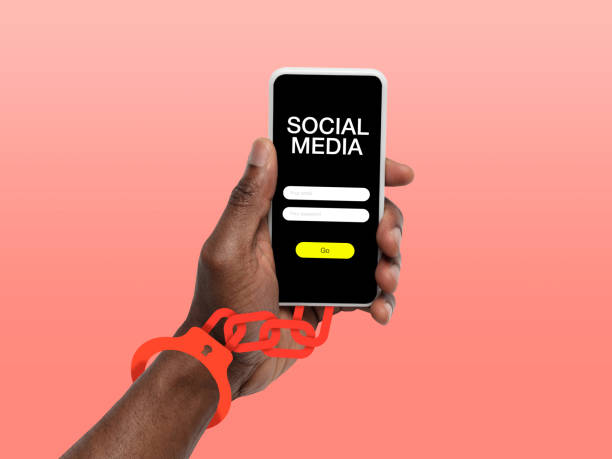In the 21st century, the excessive use of social media has become worrisome among the youth despite having its unique advantages. Many individuals make a good amount of money from social media, while others take part in the negative aspects.
My content today will be supporting the motion that social media is more harmful than beneficial to the Nigerian youths, and I will be detailing 10 key points to defend my position on this topic.
Read Also: Education Is Better Than Money (10 Debate Points)
10 Debate Points: Is Social Media More Harmful Than Beneficial To Nigerian Youth

1. Social Media Causes Distraction From Education
Many Nigerian youths today spend more time on social media than on their books. Instead of studying or doing assignments, they are busy scrolling through TikTok, Instagram, and X (formerly Twitter).
Social media has made many students perform poorly in their academics. When youths become addicted to social media, they lose focus on their educational goals. They begin to value likes and comments more than learning.
The distraction from social media has made many intelligent students forget the main reason they are in school, which is to learn and build their future.
2. It Promotes Moral Decay Among Youths
Since the coming of social media, youths have begun to lose good morals in the name of following undisciplined trends online. It has exposed Nigerian youths to all sorts of immoral content.
Many people now copy foreign lifestyles, indecent dressing, and bad behaviour they see online. This has made the moral values that Nigerians were known for fade away.
Instead of promoting our culture and decency, most youths now imitate celebrities who live carelessly and immorally. This moral corruption is spreading fast because of what young people see and share daily on social media.
3. Social Media Spreads Fake News
With the help of AI and other apps that make edits, false and fake news is now spread easily. Every day, false information spreads quickly on platforms like Facebook and WhatsApp.
Many Nigerian youths believe and share these fake stories without confirming the truth. This has led to confusion, panic, and even violence in some cases.
For example, fake news about elections or health issues can make people act wrongly. Social media gives everyone the power to post anything, whether true or false, and this causes a lot of harm to our society.
4. It Promotes Laziness And Idleness
Before the coming of social media, young people used to learn skills or read books during their free time. But now, many of them spend the whole day chatting or watching videos on Facebook, TikTok, Instagram, and more.
Youths are becoming lazy and unproductive due to the coming of social media. Instead of working hard to achieve success, they prefer to live fake lives online.
Many youths think being popular on social media is better than having real-life achievements, which is very wrong and dangerous for their future.
5. Social Media Leads To Cybercrime
Social media has made it easier for internet fraudsters, also known as “Yahoo boys,” to operate. Youths are no longer ready to become persistent and consistent in learning a skill that will be of good quality in future.
Many Nigerian youths now see cybercrime as a fast way to make money after seeing others flaunting wealth online. They have lost the culture of making clean money, and now see illegal means of becoming wealthy as the norm.
This trend is destroying the reputation of our country. Some youths have even been arrested or jailed because of their involvement in scams. If social media didn’t give such easy access, many of them might have chosen better paths in life.
6. It Increases Depression And Low Self-esteem
Most posts made by celebrities on social media are 80% not their real-life scenarios, but young people mistake these flashy lifestyles and end up feeling depressed.
Many young people compare themselves to what they see on social media. They see others posting pictures of luxury cars and expensive clothes, and start feeling worthless about their own lives. The comparison leads to sadness and low self-esteem.
Social media makes people forget that not everything online is real. Some Nigerian youths even go into depression because they feel they are not “good enough” when comparing themselves to fake online lifestyles.
7. Social Media Causes Addiction
Most Nigerian youths can no longer go a day without making use of social media. Even during classes, church services, or family gatherings, they are always online.
Social media addiction is a serious problem among Nigerian youths today. Some can’t go an hour without checking their phones. This addiction wastes valuable time that could be used for studying or learning a useful skill.
When something starts controlling a person’s time and attention, it becomes harmful, and that’s exactly what social media is doing to many youths.
8. It Promotes Online Bullying
Many youths are now bullies in the comment sections of social media; they now derive joy and talk badly to people they have never come in contact with physically. This has even led to some committing suicide.
Social media has become a place where people insult and embarrass others without fear. Many Nigerian youths have faced body shaming, hate comments, and public humiliation online.
Instead of spreading love and encouragement, social media has turned into a battlefield of insults and mockery. The negative mental and emotional effects of online bullying can last a lifetime.
9. It Exposes Youths To Fraud And Scams
Many fake online businesses, investment platforms, and giveaway pages operate freely on social media. Nigerian youths are often the victims because they easily believe in “quick money” offers.
Some people have lost their savings or even borrowed money to invest in these fake schemes. Social media has become a hunting ground for scammers who take advantage of innocent users every day.
10. It Destroys Real-life Relationships
Due to the oppression and fake life on social media by people whose lives may not be as they portray them, many fall out of their relationship, thinking there’s a greener pasture outside their relationship.
Social media has made many Nigerian youths forget how to communicate in real life. People now prefer chatting online to spending time with family and friends. This has weakened relationships and reduced respect for elders.
Some young people even fight or break friendships over online issues. Social media is making us more connected digitally but more disconnected emotionally.

Conclusion
Lastly, because of social media, many youths no longer sleep well. They stay up late at night watching videos or chatting instead of resting. Lack of sleep affects their brain, concentration, and overall health.
This constant exposure to screens and online pressure can lead to anxiety and stress. When something affects both our health and peace of mind, it is definitely more harmful than beneficial.
With these points of mine, I strongly believe you have learned how harmful social media has been to Nigerian youths. You can leave a comment, telling us whether social media has been helpful or not.




